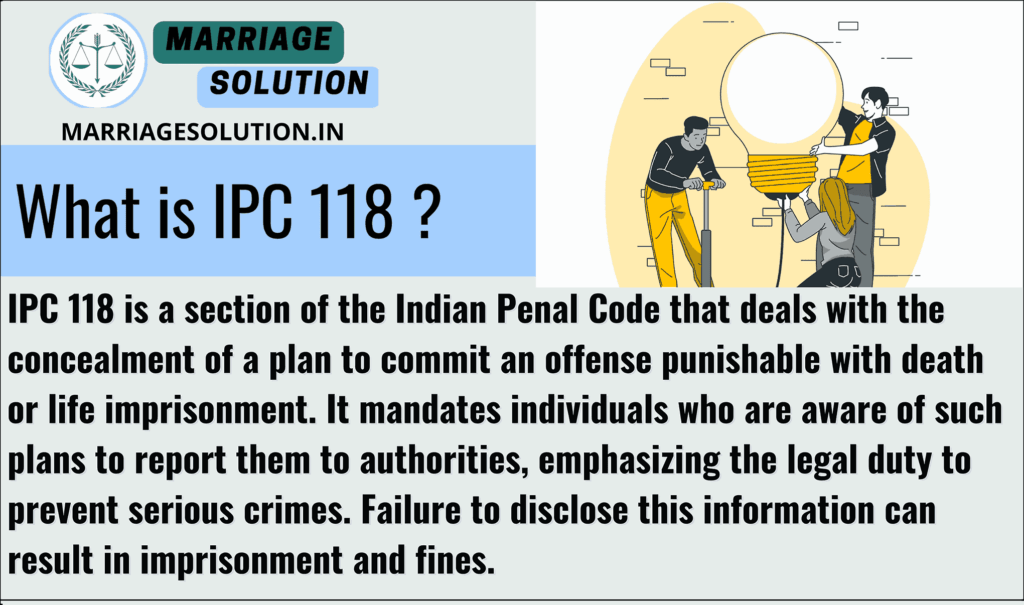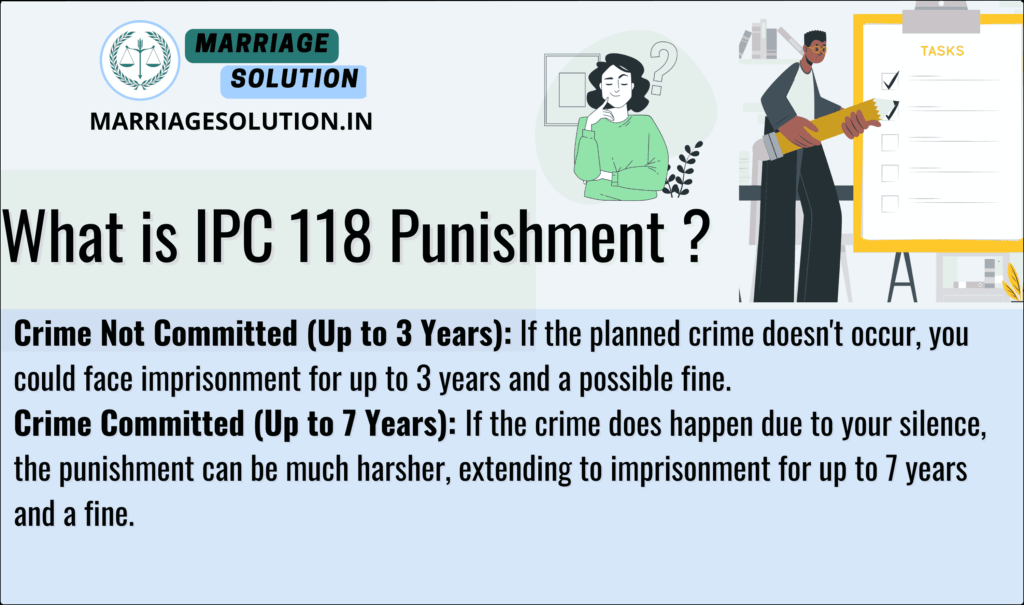Introduction of IPC 118
The Indian Penal Code (IPC) Section 118 deals with the concealment of a plan to commit an offense punishable with death or life imprisonment. This law emphasizes the legal responsibility of individuals who become aware of such plans but fail to disclose them to the authorities.
The purpose of IPC 118 is to deter concealment of serious crimes and to encourage individuals to act in the interest of public safety.
- Introduction of IPC 118
- What is IPC Section 118 ?
- Section 118 IPC Explained
- IPC 118 Punishment
- 118 IPC bailable or not ?
- Section 118 IPC case laws
- Section 118 IPC in short information
- 118 IPC FAQs
- If you need support with court proceedings or any other legal matters, don’t hesitate to reach out for assistance.
What is IPC Section 118 ?
IPC 118 mandates that if a person has knowledge of a criminal plan involving an offense punishable with death or life imprisonment, they must report it to law enforcement authorities.
Failure to do so = concealment = punishable under this section.
This provision ensures that individuals cannot remain silent when they are aware of conspiracies to commit heinous crimes.

Section 118 IPC Explained
IPC 118 deals with the concealment of a design to commit an offense punishable with death or life imprisonment. It places responsibility on individuals who know about such a criminal plan but choose not to inform law enforcement.
In short: Silence = concealment = punishable.
1. Definition and Scope
- Applies to any person who knows about a criminal plan involving offenses punishable with death or life imprisonment.
- Covers conspiracies for murder, terrorism, riots, or other grave crimes.
- Ensures individuals cannot hide information that could prevent serious crimes.
2. Knowledge of the Crime
- Liability arises only when the person has actual knowledge of the plan.
- Mere rumors or suspicions are not enough.
- The law demands responsible disclosure when knowledge is certain.
3. Concealment of the Design
- Concealment = intentionally hiding or failing to disclose information.
- It is a conscious act of silence when one should have spoken up.
- This ensures people do not passively allow crimes to happen.
4. Punishment for Concealment
- If the planned crime does not occur → Imprisonment up to 3 years + fine.
- If the planned crime does occur → Imprisonment up to 7 years + fine.
punishment is harsher if concealment directly contributes to the commission of the crime.
5. Bailable or Non-Bailable Offense
- IPC 118 is a Non-Bailable offense.
- Bail cannot be claimed as a right; it depends on judicial discretion.
- The non-bailable status highlights the seriousness of concealment.
6. Legal Implications & Responsibilities
- Section 118 creates a legal duty of disclosure.
- Individuals must act in the interest of public safety.
- Failure to report = criminal liability.
- This law reinforces that citizenship carries responsibilities beyond just rights.
IPC 118 Punishment
- If the planned crime is not committed: Imprisonment up to 3 years + fine.
- If the planned crime is committed due to concealment: Imprisonment up to 7 years + fine.
Punishment is stricter if the concealed plan results in the actual commission of the offense.

118 IPC bailable or not ?
The court may grant bail only at its discretion, considering the seriousness of the case.
IPC 118 is a Non-Bailable offense.
Bail cannot be claimed as a matter of right.
Section 118 IPC case laws
Section 118 of the Indian Penal Code (IPC) addresses the concealment of a design to commit an offense punishable with death or life imprisonment. This section imposes a duty on individuals to report any knowledge of such criminal plans. Here, we explore 10 significant case laws related to IPC 118, providing detailed explanations of each to understand its application and implications better.
Case Laws on Section 118 IPC
State of Maharashtra v. Ramdas Shankar Pande (1982)
- Issue: Accused knew of a murder conspiracy but did not report.
- Ruling: Mere knowledge ≠ concealment. Must prove intention to hide.
- Principle: Distinction between knowledge & concealment.
State of Tamil Nadu v. Nalini (1999) – Rajiv Gandhi Assassination Case
- Issue: Accused knew of the conspiracy but did not act.
- Ruling: Non-disclosure = concealment.
- Principle: Legal duty to report knowledge of conspiracies.
State of Karnataka v. Raju (2007)
- Facts: Accused knew of robbery plan likely to cause death.
- Ruling: Convicted for failure to report.
- Principle: Silence = concealment.
State of Rajasthan v. Mahesh (2001)
- Facts: Accused did not report riot plan.
- Ruling: Convicted under IPC 118.
- Principle: Concealment of communal violence plans punishable.
State of Gujarat v. Rameshbhai (2015)
- Facts: Concealed plan to poison village well.
- Ruling: Guilty, punished harshly.
- Principle: Concealment that endangers public safety = serious crime.
State of Bihar v. Manoj Kumar (2010) – Kidnap & murder plan.
State of U.P. v. Vikram Singh (2017) – Terrorist bombing plan.
State of W.B. v. Anil Kumar (2005) – Attack on police station.
State of A.P. v. Rajesh (2018) – Mass shooting plan.
State of Kerala v. Joseph (2020) – Train derailment plan.
Section 118 IPC in short information
| Offense | Definition | Punishment | Bailable or Not |
|---|---|---|---|
| Concealment of Design to Commit an Offense | Knowingly hiding information about a plan to commit a serious offense punishable with death or life imprisonment | Imprisonment up to 7 years and a fine | Non-bailable |
IPC 118 – FAQs
What is IPC 118?
IPC 118 deals with the concealment of a design to commit an offense punishable with death or life imprisonment.
What is the punishment under IPC 118?
The punishment can extend to seven years of imprisonment and a fine.
Is IPC 118 a bailable offense?
No, IPC 118 is a non-bailable offense.
Who can be charged under IPC 118?
Anyone who knowingly conceals information about a plan to commit a serious offense can be charged under IPC 118.
Why is IPC 118 important?
IPC 118 is crucial for preventing serious crimes by legally obligating individuals to report any known plans to commit such offenses.
🔗 Need Legal Help?
If you require support with IPC/BNSS cases, court proceedings, or marriage-related legal issues, visit 👉 Marriage Solution – Lawyer Help
✅ Fill our enquiry form → Get personalized legal guidance.
We are here to assist you whenever needed.
